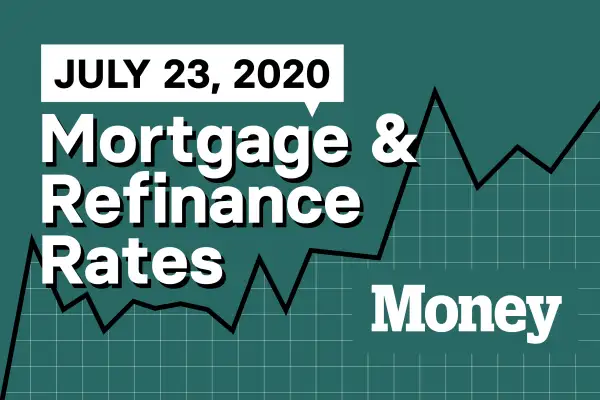Here Are Today's Best Mortgage & Refinance Rates for July 23, 2020

Historically low mortgage rates have spurred overall housing market growth to pre-COVID levels. However, as average rates tick back up over 3%, experts say that alone won't be enough to sustain the recovery.
According to Realtor.com's Weekly Recovery Report, the housing market has returned to pre-pandemic levels, reaching the January 2020 growth rates. The Housing Recovery Index reached 101 points for the week ending July 18, up 2.5% from a week ago. The Index is calibrated to read 100 as the pre-COVID benchmark.
While buyer demand remains strong, there is still concern over the tight housing supply and broader economy. According to the report, new listings are down 15% compared to last year and total housing inventory is down 33%.
"There is no blueprint for a pandemic induced recession, but this recovery milestone is further proof that homebuyers will persevere through the biggest of storms," said Javier Vivas, director of economic research at Realtor.com. "The real question will be whether the market will be able to sustain that pace through the rest of the summer and going into the fall."
All four market regions experienced growth, with the Northeast leading the way with an index of 106.3, followed by the West with a rating of 105.5. The South and the Midwest showed improvement but still lag below the benchmark with indexes of 97.9 and 97.3 respectively.
Average Mortgage Rates Today
For the week ending July 23, the average interest rate for a 30-year fixed-rate mortgage ticked up to 3.01% with 0.8 points paid, according to Freddie Mac. That's up 0.03 percentage points the previous average of 2.98%, the lowest rate recorded in 50 years of Freddie Mac's interest rate survey.
The average rate for a 15-year fixed-rate mortgage was 2.54% with 0.7 points paid, up 0.06 percentage points from the previous week, while the average rate on a 5-year adjustable-rate mortgage increased to 3.09% with 0.3 points paid.
Average Refinance Rates Today
A year ago the average mortgage rate was 3.75%. A homeowner with a $250,000 mortgage balance paying 3.75% on a 30-year loan could cut their monthly payment from $1,158 to $1,055 by financing at today’s lower rates. (It is important to consider closing fees and that refinancing could reset the clock on your mortgage, meaning you will have to make payments longer.)
Today’s Mortgage Rates
Of course, mortgage rates vary widely by location and personal factors like location, the size of your down payment and your credit score. Here are today’s advertised mortgage rates at some of the mortgage industry’s largest lenders. (The rates you see may be different.)
Quicken
Quicken, a non-bank lender based in Detroit, is the nation’s largest mortgage lender by dollar origination volume.
Mortgage rates advertised for July 23:
30-year fixed: 3.225%
15-year-fixed: 2.924%
(Quicken doesn’t advertise a five-year adjustable rate. Rates are APRs.)
Wells Fargo
Based in San Francisco, Wells Fargo has more than 7,000 locations.
Mortgage rates advertised for July 23:
30-year fixed: 3.123%
15-year-fixed: 2.829%
5-year ARM: 2.828%
(Rates are APRs.)
JP Morgan Chase
Based in New York, JP Morgan Chase has nearly 5,000 U.S. branches.
Mortgage rates advertised for July 23:
30-year fixed: 2.952%
15-year-fixed: 2.550%
5-year ARM: 2.690%
(Rates based on New York City zip code 10006. Rates are APRs.)
Bottom Line:
View Money’s Best Mortgage Lenders of 2020
Compare Money's Best Mortgage Refinance Companies of 2020
Related: Why Right Now Is the Best Time to Refinance Your Mortgage, According to David Bach
Mortgage Rates Are at Record Lows. But What Does It Take to Actually Qualify for a 3% Loan?
